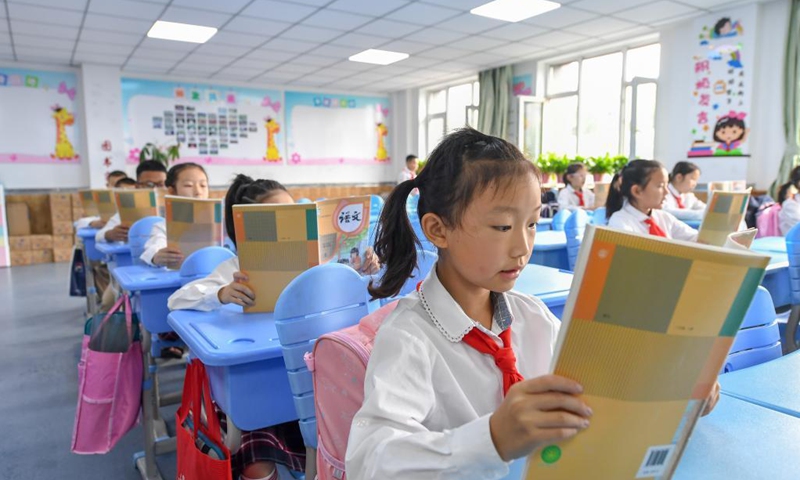
Primary students read in the morning session at a school in Changchun, capital of northeast China's Jilin Province, Aug. 23, 2021. Primary and middle schools in Changchun greeted their new semesters on Monday. (Xinhua/Zhang Nan)
China’s first official regulation on education supervision since the founding of the People’s Republic of China takes effect on Wednesday.
Education authorities said the regulation will mainly focus on local governments and schools’ implementation of the newly introduced measures to reducing pressure on students and parents as China further advances education reform across the country.
The regulation was issued by the State Council, China’s cabinet, in July and is due to come into effect on September 1, the conventional start date for schools in China.
Tian Zumeng, director of the Education Supervision Bureau under the Ministry of Education (MOE), said at a press conference on Wednesday that the regulation aims to substantially beef up the authority and effectiveness of supervision in the education system, which she said has long had a lack of accountability.
China has around 147,000 school inspectors at all levels in the country.
Education supervision institutions affiliated with local governments will monitor the behavior of relevant government departments, schools and other educational institutions according to the regulation, and will hold them accountable if they violate education policies, including performing educational duties poorly or failing to prevent bullying.
They may face criticism, administrative punishment or may be transferred to judicial organs if suspected of violating laws or committing crimes.
The regulation will mainly focus on two aspects in the supervision work: “double reduction” policies that aim to reduce homework and off-campus tutoring pressure for students, and the managements of students’ phone usage, sleeping, reading, homework and physical health, said Tian.
From May to July, education inspectors have conducted supervision in about 248,000 schools at all levels in China, Tian noted.
“The implementation of the regulation on education supervision, along with other measures recently introduced, shows that the government is serious about pushing ‘double reduction’ policies, which have been talked about for a few years,” Li Yanjie, a teacher at a high school in Fengtai district, told the Global Times on Wednesday.
Li said she is glad to see the policies taking effect from a teacher’s perspective. “It is time to draw the attention of teachers, students and parents back to the classrooms, where the ‘teaching and learning’ should really be happening,” she said.
After-school tutoring has long been a heavy burden for both students and parents in China, financially and psychologically, observers noted.
Liu Ying, a mother of a first-grade student at a junior high school in Dandong, Northeast China’s Liaoning Province, said one of her daughter’s teachers had long been teaching passively in class and leaving out the key points of the study materials, while delivering them at after-school tutor sessions.
This is a method used by many teachers in the city to “encourage” students to sign up for their tutoring classes, she said, expressing the hope that this situation will change after the regulation comes into effect.
Experts said the accountability system will make supervision work more effective, as more clear and detailed measurements of accountability are formulated in the document.
The supervision and accountability of education activities should be more flexible considering the real-life situation and should be able to address different problems in various scenarios, Chu Zhaohui, a research fellow at the National Institute of Education Sciences, told the Global Times on Wednesday.
